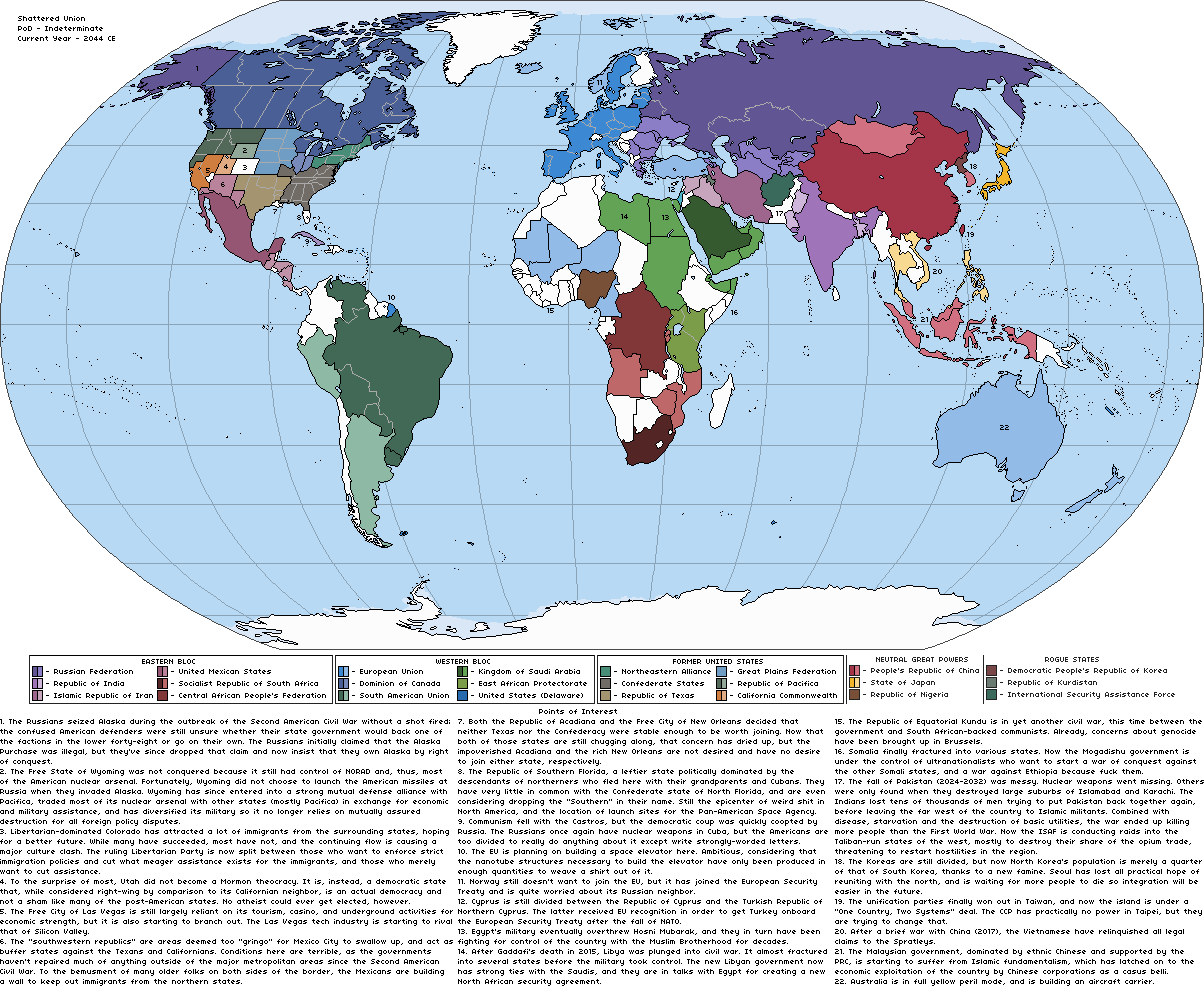HOME | DD
 RvBOMally — Shattered Union
RvBOMally — Shattered Union

Published: 2015-10-26 19:36:09 +0000 UTC; Views: 18712; Favourites: 121; Downloads: 226
Redirect to original
Description
This used to be a more crossover-esque scenario, with Frank Underwood facing off against the Allied States of America, but I decided to change it into a more straightforward cover of the 2005 game. The other version will still be made.P.S: Since I know someone will ask about it, I will address it now: I am leaving Adams' party affiliation and politics vague on purpose. The game developers did, and I don't want to go down the rabbit hole of modern electoral politics. If you must know, his politics are the exact opposite of yours, and on top of that he supports feeding children to zoo animals.
---
The assassination of the unpopular president David Jefferson Adams shattered the United States. The most unpopular president in American history - gaining the office after a disputed election helped - Adams presided over a country wracked by economic collapse, terror attacks (foreign and domestic in origin) that rivaled the September 11 attacks, along with a sharp increase in crime, rioting and general civil unrest. Adams declared martial law in 2010, and used these powers to dispose of political opponents, including those in his own party. States responded by resisting Adams' regime however they could, leading to a rise in the importance of regional politics.
When the Supreme Court - made up mostly of Adams appointees as the justices retired or died under mysterious circumstances - disqualified every candidate for the presidency apart from Adams himself, opposition to his regime became even more poignant. With the country already tearing apart at the seams and terrorism distressingly common, Adams was assassinated with extreme prejudice. On January 21, 2013, a low-yield nuclear warhead was detonated in Washington, killing Adams, Vice President Foster, and a vast majority of the United States Congress. This bomb was later revealed to be Russian, but at the time, it was attributed to one of the many domestic terror factions operating in the US. With the fall of the federal government, there was a succession crisis, and confusion.
Foreign intervention was spotty. Canadians occupied the border regions, a Japanese-led UN force occupied Hawaii, and most controversially the European Union secured Washington D.C. and the surrounding regions. A new federal government was created with EU support, with the former Secretary of Agriculture taking the presidency. This was opposed by almost every state and faction in the United States as a foreign takeover. California led the charge in rebelling against this new government, with Texas following soon after. Over the next few months, more states seceded and formed their own rival federations. Fighting soon breaks out between secessionists and loyalists, and different factions of secessionists. By 2014, the Second American Civil War has begun.
The first phase of the war involved the secessionists uniting in a broad coalition against the federal government and the EU. Federal forces were forced all the way back to Delaware, where they held out for the rest of the war, and EU attacks elsewhere were beaten back. The Canadians supported the federal government at first, but they were eventually defeated by forces loyal to the Northeast and Pacifica, and switched sides to favor the Plains Federation. With the federals gone, the secessionists could not agree on common borders, or in some cases even mutual existence, and so the second phase began: the war of secessionists against secessionists.
Initially, the Northeast and California made major gains at the expense of their rivals, but prolonged campaigning and the famine of 2015 forced them to retreat. State governments in the West, particularly those of Utah and Colorado, frequently switched sides, while Wyoming remained neutral under its nuclear umbrella. In the south, the Confederacy and Texas fought over Arkansas and Louisiana, deeply dividing those states. Missouri fought its own civil war, between pro-Plains and pro-Confederate forces. Throughout the former United States, factions of various political extremists, particularly communists, fought for their own vision of America, but they were routinely crushed by the superior secessionist forces.
However, the overall tone of the Second American Civil War is that of a pointless quagmire. No one secessionist faction was powerful enough to triumph over the others. Every major victory was reversed soon afterward. Major offensives could not be conducted due to logistical incapacity. Alliances shifted constantly, to take down large mutual threats, only to break apart as soon as the threat was mitigated. High-tech weapons were expended and destroyed early on, and the pre-war regular army killed, turning the war into primarily a battle between conscripts. As infrastructure collapsed, disease and famine were widespread. Many urban centers along the borders of the secessionist federations were all but depopulated as they were besieged and switched hands dozens of times. Throughout late 2016 and early 2017, ceasefires were signed between various, tired factions, and eventually these ceasefires solidified into a lasting peace.
As the American giant fell, the global balance of power shifted to the east. Russian president Nikolai Vladekov's gambit had paid off. While it was eventually determined by an EU study that a Russian nuclear weapon destroyed Washington in 2013, the Russians denied the results and their own study "revealed" that it was an Israeli weapon smuggled to Washington by Palestinian separatists. Russia was the true winner of the Second American Civil War: their old geopolitical rival collapsed into a group of bickering states, much as the Soviet Union had several decades before. During and after the war, Russia flexed its muscles by expanding its sphere of influence throughout the former Soviet Union, while all the European Union could do is look on.
China grew concerned with the growth of Russian power, and set out to secure its own sphere of influence in Southeast Asia. Japan remilitarized, concerned about the growth of Chinese power and the destruction of their most powerful ally. The Chinese and Japanese blocs are fluid, as the two Asian powers compete with one another. Both are competing over influence in Hawaii, which planned on joining the reunited United States, but obviously never had a chance to.
The Middle East became an Iranian playground, with Russian approval and support. The Americans in Iraq more or less fled to Saudi Arabia or Europe, awaiting transport to their home country; transport that, more often than not, never happened. Iraq was plunged into its own civil war, which ended with the Shia dominating the country with Iranian support. Israel has become isolated behind its fortified border, as its largest benefactor has disappeared, and the Israelis are starting to lay the foundations of an unholy alliance with Saudi Arabia. The Saudis themselves are still reeling from the collapse of the oil industry in the 2030s, and are desperately trying to find a way to restructure their economy. To make up for lost influence in the Middle East, the Saudis have turned to North Africa, even proposing the creation of a North African Union as a counterpart to the EU.
Interestingly, Afghanistan remained under its pro-NATO regime, as American forces under General John Konrad refused to relinquish his mission and instead took over the country as a de facto warlord. His regime, using the name of the old ISAF, continues to be a major state sponsor of anti-Iranian terrorism and a major player in the drug trade. An Iranian invasion of Afghanistan has been planned many times, but the ISAF signed mutual defense agreements with Israel and Saudi Arabia.
Africa is a mess. The Democratic Republic of Congo collapsed in the late 2010s, but became the center of a communist wave that overtook most of central Africa and created one of the most brutal regimes in the region's history. The "People's Federation" began a decades-long reign of terror that continues to this day, conducting massacres of entire villages suspected of holding counter-revolutionary sympathies. South Africa, too, has emerged from its civil war as a communist state. Both regimes have close relations to the Russians and Chinese, who both funnel money into these countries in order to protect their interest in state-owned mineral companies. Elsewhere, Nigeria has become a powerful regional player, although its oil-fueled boom is beginning to slow.
Europe is divided between Russia and the European Union. The European Union has shrunk in size since the early 2000s, but centralized over time as well. The EU was poised to become the next superpower, but it could never fill the void that the Americans left in global geopolitics, even if it wanted to. The Second American Civil War created a de facto unified EU military, and the economic crisis preceding, during, and succeeding the war unified the EU economically and politically. After the humiliation of the Second American Civil War, the EU has shirked away from foreign intervention, repurposing their military to resisting Russian influence. Conflicts over unification, particularly free movement of peoples and economic integration, led to much of southeastern Europe leaving the EU.
South America has fallen under Brazilian orbit, as that nation rose in prominence and the American giant faded. The Brazilian-led South American Union was intended to mimic the European Union, but it has become a de facto Brazilian empire. This has led to growing opposition in states such as Argentina and Chile. The rest of Latin America has fallen under the Mexican sphere of influence. Mexico participated in the final stages of the Second American Civil War, and has received a boost in skilled workers from fleeing Americans. Russian military and economic support, to secure Mexico as a southern buffer to its former rival, also helped solve much of Mexico's problems. Modern Mexico is now an economic and political juggernaut, more than capable of commanding the respect of its northern neighbors.
North America remains fractured and under the rule of corrupt dictatorships. Canada has maintained its democracy, but has spent billions on repairing the ghettoes of Michigan. With nearly a quarter of the Canadian population being American in origin, Canada has seen another major ethnic minority in opposition to both Anglo and French Canadians. Canada also maintains a comparatively large military, to watch its frontier, as its only major ally is the corrupt, nominally democratic Great Plains Federation. The most powerful of the post-American states is California, which is enjoying better relations with China than the old United States did, but its politics remain in gridlock as the president's Democratic Party is always at odds with the Labor Party, which as taken both houses of Congress. Its northern neighbor, Pacifica, has taken an isolationist stance after the war, and it is now facing the issue of white nationalist separatists in its eastern provinces threatening civil war. The Californians are supporting the separatists in the State of Jefferson, believing that this would give them the opportunity to retake what they continue to insist is an integral part of the State of California. The Great Plains Federation was heavily damaged in the war, but has regained control of its common border with its neighbors and has started its own nuclear program. Texas and the Confederacy, both military theo-dictatorships, continue their rivalry over the South, while in the north, the Northeastern Alliance is on the brink of shattering, as the more distant portions of the alliance demand more representation in New York City and are questioning the waves of centralization that have swept the alliance in recent years.
Related content
Comments: 81

I don't know what those lines are. I'll remove them.
No parts of America joined Ontario. They joined as new provinces.
👍: 0 ⏩: 1

Yeah, I guess that would make sense. Culturally distinct, plus it would throw the electoral districts out of wack.
👍: 0 ⏩: 1

You never want to annex too much foreign territory. That leads to massive instability.
👍: 0 ⏩: 2

How well have the Americans taken Canadian "help"?
👍: 0 ⏩: 1

Well, considering all of the anti-Canadians have left or were killed during the war.
👍: 0 ⏩: 0

Which is why Indiana and Illinois are protectorates instead of provinces.
👍: 0 ⏩: 1

They're considered provinces.
👍: 0 ⏩: 1

Funnily enough it almost seems like Japan and China will warm to each other in the future of this timeline. The don't really have much of a reason to oppose each other anymore and they both gain to secure a stable Pacific North America and an undermined Eastern Bloc. Also dealing with North Korea.
Though I'd imagine any sort of East Asian Alliance would be met by a massive swelling of Yellow Peril the likes of which few could comprehend.
👍: 0 ⏩: 1

The generations still bitter about WWII have died out, so the newer generations in China and Japan are less hostile to the idea of warmed relations. However, the relationship is still competitive.
👍: 1 ⏩: 0

I remember being somewhat annoyed at the Shattered Union map because it showed Ohio as a "leftover state". Of course, it's not hard to imagine an army from New York City and Philly crushing whatever resistance weak Cleveland and Akron can manage and hitting Columbus hard. What's the status of Ohio? Also, what would you be doing in this world?
👍: 0 ⏩: 1

Ohio is the center of a movement to break away from the Northeast, or at least demand more government funding, as the area is largely neglected by New York and still heavily damaged from the war.
As for what I'd be doing? Rotting in a mass grave.
👍: 0 ⏩: 1

What is the International Security Assistance Force, where is it located and what does I consist about?
👍: 0 ⏩: 1

Nice! I haven't played the game, but I am sort of familiar with it.
How strong the Pan-American Space Agency? Are all the major players in the former US part of it?
Also, is there still a Kim in charge of NK?
👍: 0 ⏩: 1

The Pan-American Space Agency is akin to the modern Chinese space agency. Only Canada, the Northeast, California, and Pacifica are part of it.
The military is in charge of NK.
👍: 1 ⏩: 0

Awesome, based on some PC game I have yet to play (and if you ask me looks mighty interesting)! Oh and I see a mentioning of a certain "Joseph Konrad"...hmmm I hate to see some US Army man whose last name is "Walker".
👍: 0 ⏩: 2

👍: 0 ⏩: 0

I haven't actually played the game. I heard it was okay.
👍: 0 ⏩: 1

Me too, didn't look terrible judging by the screenshots I saw a long time ago.
👍: 0 ⏩: 1

It has an interesting concept regarding shooting games I've read
👍: 0 ⏩: 0

Since I live about two hours from Canada, I would've most likely escaped this madness, right?
👍: 0 ⏩: 2

As long as you don't mind the cold and snow, the hockey, Tim Horton's everywhere, tartan flannel shirts, and our maple syrup and poutine-based cuisine, eh?
*disclaimer: I'm a Canuck myself, so I get to laugh at my own country as much as I damn well please.
👍: 0 ⏩: 1

I had poutine once. It was nice.
👍: 0 ⏩: 1

Happy to know you liked it; it's kind of a "love it or hate it" food, even among us Quebecois (kinda like vegemite for Britons, except with a higher ratio of fans and less vitriolic detractors).
👍: 0 ⏩: 0

Thanks, although admittedly my standards are rather low.
👍: 0 ⏩: 1

Yeah well I never liked it when they get to far up their own ass in details.
👍: 0 ⏩: 0
<= Prev |
























